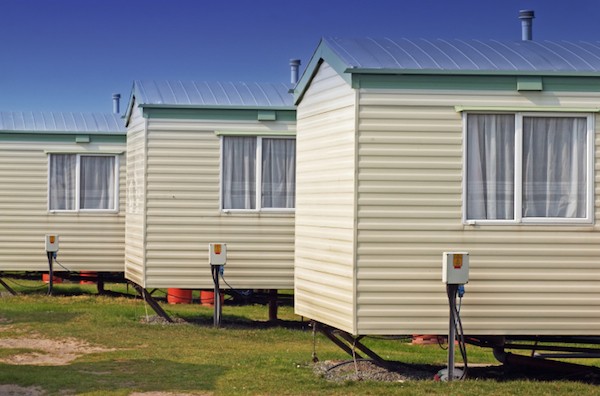Moving a trailer home, also known as a manufactured home, is a significant undertaking that involves much more than just hitching it to a truck and driving away. Understanding the costs associated with this process is crucial for budgeting and planning. This guide breaks down the various factors influencing the price of moving a trailer home, ensuring you’re well-informed before making any decisions.
Understanding the Costs: Transport-Only vs. Full-Service
The total expense hinges on whether you opt for a transport-only or a full-service move. A transport-only move typically includes attaching the move-ready trailer home to a towing vehicle, transporting it to the new location, and detaching it. The moving company also handles necessary permits and provides liability insurance.
A full-service move, on the other hand, encompasses everything in the transport-only option, plus disconnecting utilities, dismantling skirting and attached structures, and reconnecting everything at the new location. This comprehensive service naturally comes at a higher price.
Estimating the Expenses
As a general estimate, a transport-only move can range from $700 to $3,500. A full-service move will likely cost between $3,000 and $14,000.
According to data, a transport-only move for a distance up to 60 miles might cost around $700-$1,000 for a single-wide, $2,000-$2,500 for a double-wide, and $2,600-$3,500 for a triple-wide.
For a full-service move within the same distance (up to 60 miles), expect to pay $3,000-$5,000 for a single-wide, $4,000-$10,000 for a double-wide, and $10,000-$14,000 (or more) for a triple-wide. Keep in mind that these are only estimates, and actual costs can vary.
 Light yellow mobile homes on grass to help illustrate the cost of moving a mobile home
Light yellow mobile homes on grass to help illustrate the cost of moving a mobile home
Key Factors Influencing the Cost
Several factors contribute to the overall cost of moving a trailer home:
- Labor costs: The hourly rates of the moving crew.
- Setup services: Fees for disconnecting and reconnecting utilities, skirting, etc.
- Moving materials: Costs for tools, supplies, and equipment.
- Home size: Single-wide, double-wide, or triple-wide.
- Permits: Fees for transportation and setup permits.
- Location: Distance to the new location and accessibility.
- Travel distance: The number of miles the trailer home will be transported.
- Local regulations: Specific regulations in the origin and destination locations.
- Transportation fees: Costs for towing vehicles and pilot cars.
Long-distance moves incur higher costs due to per-mile charges. Moving companies typically charge around $4-$5.50 per mile for the towing vehicle and approximately $1.50-$1.65 per mile for pilot cars. These rates are also subject to fluctuations in fuel prices.
Drilling Down: Cost-Affecting Elements
The following elements significantly affect the final cost:
Distance of the Move
Shorter moves are generally cheaper. Longer distances mean higher fuel consumption and more wear and tear on equipment. Furthermore, extended moves may require replacing tires and equipment to ensure safe transport.
Size of the Trailer Home
The larger the trailer home, the more it will cost to move. Single-wides are cheaper to move than double-wides. Oversized homes might necessitate a police escort or temporary road closures, adding to the expense. Taller homes may restrict travel routes, leading to longer distances and increased costs.
Weight of the Trailer Home
Older trailer homes typically weigh between 35 to 40 lbs per square foot, while newer manufactured homes weigh approximately 45 to 50 lbs per square foot. A heavier trailer home requires more robust moving equipment, increasing the overall cost.
Permits and Inspections
Moving a trailer home across counties or states necessitates permits for each jurisdiction. Movers can typically assist in acquiring these permits. Additionally, some states mandate inspections of older trailer homes to ensure they meet safety standards.
Moving Materials
Moving a trailer home requires various tools, supplies, and equipment. The moving company should provide a detailed breakdown of these costs in their contract.
Setup Services
Hiring full-service movers will add to the overall cost. In addition to transportation, these movers charge fees for disconnecting and reconnecting utilities, removing and reinstalling porches, foundations, and interior features. Reconnecting a double-wide trailer home can cost between $1,000 and $5,000.
Age and Condition
Older trailer homes or those in disrepair may require additional time and effort to prepare for transport, resulting in higher costs.
Insurance and Liability
Purchasing liability coverage is essential when using professional movers. Consider additional insurance to cover the trailer home during transport. Check with your existing insurance provider to determine if your current policy covers the trailer home while it’s being moved.
Why Hire Professionals?
Moving a trailer home independently is not recommended. Professional movers possess the necessary training and experience to handle the complexities of such a move. For long-distance or interstate moves, multiple movers might be required due to licensing restrictions.
While hiring professionals isn’t cheap, the benefits are considerable:
- Permit Acquisition: Movers handle all necessary permits, saving you time and hassle.
- Transportation Expertise: Experienced drivers safely transport the trailer home, minimizing the risk of accidents.
- Time and Energy Savings: Hiring a moving company prevents potential issues like tire blowouts and setup problems.
Essential Tips for a Successful Move
- Research and Compare: Obtain multiple quotes from reputable moving companies, check reviews, and verify insurance policies.
- Account for Add-ons: Inform movers about any sheds, decks, or air conditioning units to avoid unexpected charges.
- Check HUD Regulations: Ensure your trailer home meets the Wind Zone, Roof Load, and Snow Load requirements for the new location. This information can be found on the HUD data plate inside your home.
- Understand Local Legal Requirements: Research building standards and property age laws in the new location.
- Provide Notice: Adhere to the notice period specified in your lease agreement.
- Coordinate Utilities: Contact utility companies to schedule disconnections and reconnections.
- Prepare the New Site: Ensure the new location is ready to accommodate the trailer home.
- DIY Select Tasks: Reduce costs by packing belongings yourself and renting a moving van.
- Prepare the Trailer Home: Secure doors and windows, remove loose items, and ensure the wheels and tires are road-worthy.
Common Questions Answered
How much does it cost to move a trailer home?
The cost varies widely, ranging from $700 to $14,000 or more, depending on factors like distance, size, and services required.
Do I need a permit to move a trailer home?
Yes, and a reputable moving company should assist with obtaining the necessary permits.
Can I move my trailer home on my own?
It’s strongly discouraged due to the complexity and potential risks involved.
Ready to Move?
Moving a trailer home requires careful planning and budgeting. By understanding the factors that influence the cost and hiring experienced professionals, you can ensure a smooth and successful relocation.
